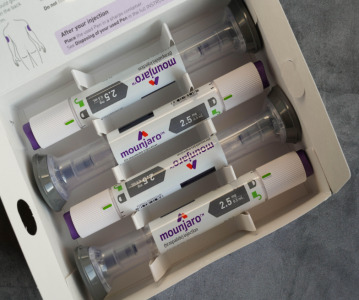FDA Approves First Sublingual Allergen Extract for the Treatment of Certain Grass Pollen Allergies?

FDA recently approved Oralair to treat allergic rhinitis (hay fever) with or without conjunctivitis (eye inflammation) that is induced by certain grass pollens in people ages 10 through 65 years. Oralair is the first sublingual (under the tongue) allergen extract approved in the US. After administration of the first dose at the health care provider’s office, where the patient can be observed for potential adverse reactions, Oralair can be taken at home.
Allergic rhinitis with or without conjunctivitis are chronic diseases affecting children and adults. These allergic diseases affect approximately 30 million people in the US and more than 500 million persons worldwide. These diseases are often caused by sensitivity to grass pollen. Affected people may suffer from repetitive sneezing, nasal itching, runny nose, nasal congestion, and itchy and watery eyes.
“While there is no cure for grass pollen allergies, they can be managed through treatment and avoiding exposure to the pollen,” said Karen Midthun, MD, director of the FDA’s Center for Biologics Evaluation and Research. “The approval of Oralair provides an alternative to allergy shots that must be given in a health care provider’s office. Oralair can be taken at home after the first administration.”
Oralair is a once-daily tablet that rapidly dissolves after it is placed under the tongue. Oralair is started 4 months before the start of the grass pollen season and continued throughout the season. The first dose is taken at the health care provider’s office, where the patient is to be observed for at least 30 minutes for potential adverse reactions.
Oralair contains a mixture of freeze-dried extracts from the pollens of five grasses, including Kentucky Blue Grass, Orchard, Perennial Rye, Sweet Vernal and Timothy.
The safety and effectiveness of Oralair was evaluated in studies in the US and Europe, involving approximately 2500 people. Some patients received Oralair; others received an inactive substitute (placebo). To assess the effectiveness, patients reported their symptoms and additional medications needed to get through the allergy season. During treatment for one grass pollen season, patients taking Oralair experienced a 16–30% reduction in symptoms and the need for medications compared to those who received a placebo.
The prescribing information includes a boxed warning that severe allergic reactions (such as anaphylaxis, which can be life-threatening) can occur. Oralair also has a medication guide for distribution to the patient. The most common adverse reactions reported by adults were itching in the ears and mouth and of the tongue, as well as swelling of the mouth and throat irritation. In children, the most commonly reported adverse reactions were itching and swelling in the mouth and throat irritation.
Oralair is manufactured by Stallergenes S.A. of Antony, France.
Related News
-
News The next 15 drugs up for negotiation with Medicare include several blockbusters
By now, everyone is quite familiar with the drug price negotiations taking place between drug companies and the Centres for Medicare & Medicaid Services (CMS) in the USA as part of measures being taken to reduce the cost of drugs for patients, to make ... -
News PSCI Welcomes Delpharm, Samsung Biologics, and Suven as First Supplier Partners
The pharmaceutical industry continues to evolve with an increasing focus on responsible sourcing, sustainability, and collaboration across the supply chain. Under a new model to recognise suppliers within the pharmaceutical and healthcare industry that... -
News Drug prices agreed upon as part of the US Inflation Reduction Act
The Inflation Reduction Act brought into constitution by the Biden administation in 2022, which proposed a drug price negotiation between the government and pharmaceutical companies, has reached it's first agreement. -
News Eisai Alzheimer’s drug authorised in UK but still faces obstacles
In partnership with BioArctic AB, pharmaceutical company Eisai has been granted Marketing Authorisation by the Medicines and Healthcare products Regulatory Agency (MHRA) for its Alzheimer’s disease drug product Leqembi. -
News Eli Lilly's weight loss drugs removed from the FDA's shortage list
The US FDA have recently updated their drug shortage list. The recently released list shows that all dosage forms of Eli Lilly's weight-loss drug Zepbound and their diabetes drug Mounjaro are now available. -
News Global advancements in the diagnosis and treatment of rare diseases: Rare Disease Day 2024
Rare Diseases Day is celebrated on the 29th February 2024 and represents the plight of rare disease patients to gain diagnosis and access to suitable treatment. -
News Pharmaceutical industry supports COP28 health stance in joint statement
As COP28 takes place over this week in Dubai, UAE, several bodies in the pharmaceutical and health industries have come together to announce support of key movements in sustainability in the sector, and to recognise sustainability as a health issue.&nb... -
News Biden backs Cold-War measures to shore-up medical supply chains
In a recent strategy to combat rising inflation and the cost of living crisis, President Joe Biden has invoked a Cold War-era act to increase investment in a selection of medicines and supplies.
Recently Visited
Position your company at the heart of the global Pharma industry with a CPHI Online membership
-
Your products and solutions visible to thousands of visitors within the largest Pharma marketplace
-
Generate high-quality, engaged leads for your business, all year round
-
Promote your business as the industry’s thought-leader by hosting your reports, brochures and videos within your profile
-
Your company’s profile boosted at all participating CPHI events
-
An easy-to-use platform with a detailed dashboard showing your leads and performance



.png)



